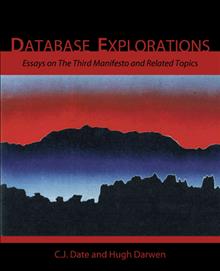
|
FreeComputerBooks.com
Links to Free Computer, Mathematics, Technical Books all over the World
|
|
- Title Database Explorations: Essays on The Third Manifesto and related topics
- Author(s) C.J. Date and Hugh Darwen
- Publisher: Trafford Publishing (July 13, 2010); eBook
- Paperback: 548 pages
- ebook PDF (544 pages)
- Language: English
- ISBN-10: N/A
- ISBN-13: 978-1426937231
- Share This:

|
This book consists of a collection of exploratory essays on database management - more specifically, on issues arising from and related to The Third Manifesto, which is a proposal by the authors for a foundation for data and database management systems (DBMSs)
The target audience is database professionals. Thus, we assume you’re somewhat familiar with both the relational model and the SQL language (though certain relational and/or SQL concepts are reviewed briefly here and there - basically wherever we felt such explanations might be helpful).
About the Authors- C. J. Date is an independent author, lecturer, researcher, and consultant specializing in relational database systems.
- Hugh Darwen has been involved in software development since 1967 as an employee of IBM United Kingdom Ltd.

- Database Explorations: Essays on The Third Manifesto and Related Topics
- Book Homepage (Errata, Videos, Docs, etc.)
-
 A Primer on Database Replication (Brian Storti)
A Primer on Database Replication (Brian Storti)
Replicating a database can make our apps faster and increase our tolerance to failures, but there are a lot of different options available and each one comes with a price tag. Reduce the effort in the Database Replication work to be done to get problems solved.
-
 Build Your Own Database From Scratch: Persistence, Indexing, etc.
Build Your Own Database From Scratch: Persistence, Indexing, etc.
This book contains a walk-through of a minimal persistent database implementation. The implementation is incremental. We start with a B-Tree, then add a new concept with each chapter, and eventually go from a simple KV to a mini relational DB.
-
 Database Lifecycle Management: Achieving Continuous Delivery
Database Lifecycle Management: Achieving Continuous Delivery
This book describes how to apply the business and technical approaches of Database Lifecycle Management (DLM) in order to make database change management processes more visible, predictable and measurable.
-
 Database Design, 2nd Edition (Adrienne Watt, et al)
Database Design, 2nd Edition (Adrienne Watt, et al)
This book covers database systems and database design concepts. It provides short, easy-to-read explanations of how to get database design right the first time and to help you avoid the many pitfalls that entrap new and not-so-new database designers.
-
 Databases, Types, and the Relational Model: The Third Manifesto
Databases, Types, and the Relational Model: The Third Manifesto
This book can be seen as an abstract blueprint for the design of a DBMS and the language interface to such a DBMS. In particular, it serves as a basis for a model of type inheritance. This book is essential reading for database professionals.
-
 Database Design with UML and SQL, 4th Edition (Alvaro Monge)
Database Design with UML and SQL, 4th Edition (Alvaro Monge)
This book teaches you how to use the Unified Modeling Language (UML) and Structured Query Language (SQL) to develop and implement the best possible design for your databases. It is also designed to be used as an individual self-study tutorial.
-
 Concurrency Control and Recovery in Database Systems
Concurrency Control and Recovery in Database Systems
This book is about techniques for concurrency control and recovery. It covers techniques for centralized and distributed computer systems, and for single copy, multiversion, and replicated databases.
-
 Theory of Relational Databases (David Maier)
Theory of Relational Databases (David Maier)
The book is intended for a second course in databases, but is an excellent reference for researchers in the field. The material covered includes relational algebra, functional dependencies, multivalued and join dependencies, normal forms, etc.
-
 The Relational Model for Database Management (Edgar F. Codd)
The Relational Model for Database Management (Edgar F. Codd)
Written by the originator of the relational model, this book covers the practical aspects of the design of relational databases. This book is a perfect resource for students and professionals in the field.
-
 Foundations of Databases: The Logical Level (Alice's book)
Foundations of Databases: The Logical Level (Alice's book)
Written by three leading researchers in the field, this book provides in-depth coverage of the theory concerning the logical level of database management systems, including both classical and advanced topics.





